Consultant for an NGO in Uganda
Together against violence against girls and women
by Vanessa Hugo
“Organisational consultant for a non-governmental organisation in Kampala, Uganda” is what EIRENE’s job advertisement said in February 2015. I had just returned from spending 18 months in Tanzania, where I had completed a term of voluntary service in various projects of the Tanzanian Red Cross and had then worked at the national office of Plan International. I had already fallen in love with the coast of Kenya during a field visit as part of my research for a Master’s degree (MSc) in Global Health. And after visiting a friend – we originally met as students – in Uganda in 2014, the third East African country, Tanzania, had aroused my interest. In retrospect, when I returned from Tanzania, it was only my body which happened to be on German soil; In my thoughts I was still in Tanzania, where I was still deeply involved in the work which I had left behind and in the country and its people. Before I went abroad, although I was involved in international project work in the health sector in Germany, I rarely had anything much to do with development cooperation. It was only when I was studying for my Master’s degree that the desire to become a development worker crystallised itself. I wanted to do something meaningful in an intercultural context. So in 2015 the only thing which stood between my wish and reality was an application and the selection procedure. When I received the news from EIRENE that I was to be deployed with Action for Development (ACFODE), their partner organisation in Kampala, I was overjoyed. Four months later, after taking part in various preparation courses, I landed at Entebbe Airport.
Together against violence against girls and women
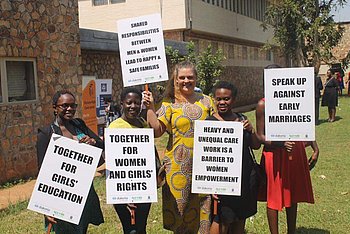
The partnership between ACFODE and EIRENE was established in 2012. EIRENE, as an International Christian Peace Service, works in cooperation with partner organisations around the world to promote justice and peace. ACFODE has been working to promote women’s rights throughout Uganda since 1985.
The knowledge and understanding which ACFODE gains through its work “on the ground” is fed into advocacy and lobbying. Between 2012 and 2015 the two organisations jointly implemented several projects for the prevention and reduction of sexualised and gender-based violence against girls and women.
The funding for the projects came from the BMZ (Federal Ministry for Economic Cooperation and Development). During the 2015-2018 project phase, ACFODE and EIRENE worked with the local population in Kisoro District to promote positive socio-cultural practices which further the realisation of women's rights. At the same time, the local people also identified harmful practices which they wanted to reduce, such as, for example, alcohol consumption, domestic violence, and under-age marriage. In Uganda, as in many other countries, the violation of women's and girls' rights is a consequence of the lower social status of women and girls. Social gender constructs lead to injustice, discrimination, and violence. Although there are wide-ranging laws which prohibit violence against women and girls in Uganda, 56% of women have experienced domestic violence. 46% of married women say that they are afraid of their partner. The involvement of men and boys is therefore a central part of ACFODE's work and, in the area covered by the project, work was done using “model couples” as role models.
From preparation to practice
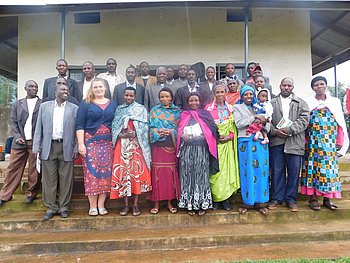
During my preparation for service I had read up about the work of ACFODE and taken part in numerous preparation courses with titles such as “Counselling skills” and “Understanding organisations and facilitating change”. And I had learned as much as I could about the country. During the preparation for deployment, at EIRENE in Neuwied, we reflected a lot on our future roles as professional development workers. EIRENE's understanding of partnership is based on joint planning and action, learning together, and working together to build structures for the creation of positive peace.
So I knew all the theory when I appeared in the ACFODE office on my first working day. That's when the questions first came into my mind as to how I was supposed to – or wanted to – fill the role, for which I had been so thoroughly prepared, in actual practice. The director of ACFODE also wanted to have a clearer idea of what my tasks were going to be. So we drew up an agreement covering a whole list of areas of work: improving project management, further developing monitoring and evaluation, increasing networking and fundraising activities, advising on strategic planning, lobbying and advocacy. ACFODE had high expectations. And the 20 employees had a variety of needs in terms of advice. ACFODE also operated with a wide-ranging portfolio, from promoting democracy and preventing violence to income generation. So I had plenty to do during the next three years.
During the preparation courses for outgoing development workers, I had learned how important the role of advisor is, especially if the deployment is to have a lasting impact, and how the role needs to be clearly distinguished from that of a manager. The “doer” within me, who was otherwise so active, was going to have to give way to the role of advisor. And yet it is so much easier to assess work outcomes in terms of completed tasks than it is to measure the extended capacities of employees or organisational and process-related change. I found fulfilling my role very challenging, especially during the first few months. I often asked myself at the end of the day whether my colleagues had really learned anything from me or whether I wasn’t actually doing “learning service” myself, in which the primary objective was for me to learn.
Partnerships need to grow
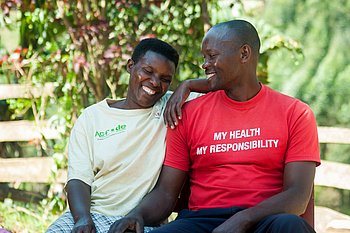
Indeed, during the first year I learned a great deal about life and project work in reality. I built up networks, developed my skills and competence in the field of gender and development cooperation, and built up a large repertoire of soft skills. Had I given anything to ACFODE in return? It was only during the second year that I noticed that ACFODE employees were taking the initiative and coming to me for advice about project work and strategic organisational issues. I recognised that partnerships have to grow. I had to build trust to start with and convince people of my competence.
When I told the project coordinators about quality assurance measures, I was enabling them to develop additional project management skills.
There was better measurement of project outcomes, the reporting system worked better and better, and we developed new formats for political work.
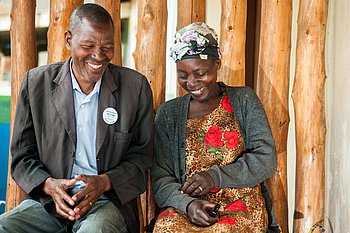
We used the networks which I had built up with other organisations and donors to make ACFODE better known, to raise funds, and to share experience and ideas.
There was cooperation with GIZ (the German Society for International Cooperation), for example, and a successful start to the work with refugees. I often felt like a kind of link – a mediator between the bureaucratic requirements of international donors and the realities of life and work in Uganda. But in addition to specialist knowledge and skills, I was also able to introduce various activities by giving workshops on mindfulness, relaxation, and yoga, for example. The workshops were very much appreciated by my colleagues.
Back in Germany - the other side of project work
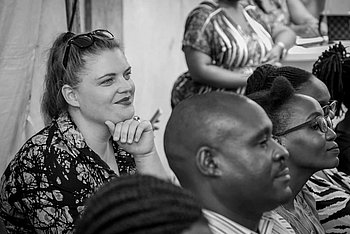
After three-and-a-half years in Uganda, my job unfortunately fell victim to new donor regulations and in December 2018 my husband and I packed our suitcases. ACFODE organised a big farewell party. My working relationships with the director and some of my colleagues have developed into lasting friendships. I’m now working in development cooperation in Germany – coordinating projects in the health sector with partner organisations in the global South.
Every day I make use of all that I was able to learn in Uganda. Project visits are always the great highlights of my work. One of our partners in Sierra Leone gave us positive feedback on our cooperation: "You're different from the others. You listen to us and understand us.” It is exciting for me to get to know the other side of the project work, to establish better connections with the structures and institutions of development cooperation in Germany, and to make use of the many opportunities for further training.
My voluntary activities in the field of development policy since undertaking development service have mostly been participation in events organised by AGdD, e.g. giving a lecture on gender justice in Uganda in cooperation with the VHS (adult education centre) in Bonn and facilitating training workshops and meetings for returnees. Now I have also become a member of EIRENE, so I’m looking forward to becoming more involved. Effective international cooperation and development cooperation depend on people who plan and implement such cooperation. I’m very thankful that I’m able to play a part in all of this.
